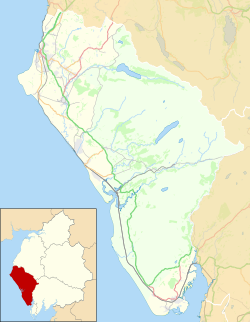| Kirksanton | |
|---|---|
 King William IV Free House, Kirksanton | |
Location within Cumbria | |
| OS grid reference | SD139807 |
| Civil parish | |
| Unitary authority | |
| Ceremonial county | |
| Region | |
| Country | England |
| Sovereign state | United Kingdom |
| Post town | MILLOM |
| Postcode district | LA18 |
| Dialling code | 01229 |
| Police | Cumbria |
| Fire | Cumbria |
| Ambulance | North West |
| UK Parliament | |
Kirksanton is a village on the A5093 road, in the Cumberland district, in the county of Cumbria, England. Nearby settlements include the town of Millom, and the villages of Silecroft and Whicham.
Contents
In April 2009, Secretary of State for Energy and Climate Change Ed Miliband included Kirksanton in a list of eleven potential new nuclear power plants. [1] The site was ruled out by the new Government's Energy Secretary Chris Huhne in October 2010 when the list of potential sites was reduced to eight, Braystones the only other potential new nuclear site at the time, was subsequently rejected also. [2]
The village is located just outside the Lake District National Park.

